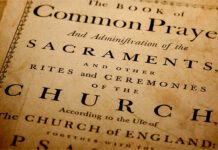[EDITOR’S NOTE: The following six-part series of blogs are adapted from a paper I wrote this year in my Pentateuch class with Dr. John Goldingay at Fuller Theological Seminary. These thoughts are not meant to be the final word on the matter, nor to form a sort of apologetic against atheists. This is not material for an argument. It is simply a response based on a closer reading of the Torah– the first five books of the Bible. My hope is that it will help Christians avoid simplistic views about the “God of the Old Testament. Read Part 1 HERE and Part 2 HERE.]
Claim # 3: “The God of the Old Testament is…vindictive, bloodthirsty ethnic cleanser…”— Richard Dawkins, The God Delusion.
Is God a Vindictive, Bloodthirsty Ethnic Cleanser?
The third claim is that God is a “vindictive, bloodthirsty ethnic cleanser.” There is legitimate evidence in the Torah for this claim. God kills the firstborn males in Egypt and “gives” them a land that requires cleansing it of its inhabitants. All along the way from Egypt to Canaan, there are people groups that Israel fight in battle, with YHWH providing the victory. (See: Amalekites.)
But there is also a thread of God’s love and ultimate goal for ethnic outsiders. Right from the beginning, the plan is to bless “all the families of the earth.” As selective or exclusive as the call of Abraham in Genesis 12 appears to be, the point is always “all the families of the earth.” As C. S. Lewis once wrote, God uses the “chosen” for the sake of the “unchosen.” Abraham seems to grasp this when he prays for Sodom and Gomorrah—two cities that clearly fall in the “unchosen” category—to be spared despite their wickedness. Perhaps Abraham saw God’s redemption up close and personal in the way that God promised to bless and protect Hagar, despite her status as a discarded Gentile servant woman.
The Torah, however, shows the good, bad, and ugly. It is not long before the people of God begin to narrow their vision and trend toward an exclusive view of themselves as the people of God. The ugliest picture of this is in Genesis 34 when Simeon and Levi kill every male in Shechem’s land, after tricking them into getting circumcised. Their reluctance to let their sister, Dinah, be married to Shechem seems to be more than for ethnic or racial reasons; they are outraged by the fact the she was “defiled” by him. Yet, their hatred and murderous actions are acted out along ethnic lines.
The sign of hope for other ethnic groups is the story of Joseph in Egypt. Here God begins to bless Egypt and its leaders through Joseph. Joseph, one from the family of Abraham, brings blessing to Egypt, an empire outside God’s “chosen family.” Joseph gains favor first from Potiphar, then from Pharaoh. Ultimately, God gives Joseph the ability to interpret Pharaoh’s dreams in order to help them survive the years of famine. Then, in a strange twist of events, Egypt becomes the means of blessing to Abraham’s descendents—Joseph’s brothers. The fates of various ethnic groups are tied together in the Torah.
God’s plan, His intention from the outset in Genesis 12, is to bless “all the families of the earth.” Israel, Abraham’s descendants, struggle to follow their commission, but YWHW keeps intervening to keep the plan roughly on track. The fact that YHWH commissions the killing of entire people groups—and livestock!—in Joshua is still problematic. The best we can say about this is that it is not, as Dr. John Goldingay would say, “God’s last word” on the subject. His final purpose for the nations is not one of destruction but of redemption. The book of Jonah, though not in the Torah, gives a picture of this as the entire capital city of the wicked Assyrian kingdom is spared because of their repentance. Jonah’s own resentment at God’s mercy juxtaposes for us Israel’s prejudiced attitude toward other ethnic groups against God’s attitude toward them: we may harbor prejudice and hatred, but God seeks to redeem all who would turn away from their sin.
What the Torah reveals, then, is not a “vindictive” and “unforgiving” God, but a God who is “merciful and gracious, slow to anger, and abounding in steadfast love and faithfulness, keeping steadfast love for thousands, forgiving iniquity and transgression and sin” (Exodus 34:6b-7a). The Torah always states God’s love and compassion first, and his judgment as a warning second. More significantly, God’s love and compassion far outlast and outweigh His judgment. Punishment goes to the “third and fourth generation”, but His loving-kindness goes to a “thousand generations” (Exodus 20 and Deuteronomy 5). Love and forgiveness, as Goldingay suggests, is at the core of YHWH’s nature, while anger and judgment are at the “fringes” of His personality. God gets angry, but He is Love.











